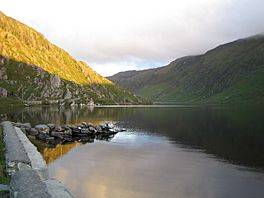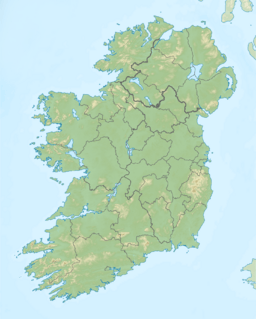Glenbeg Lough facts for kids
Quick facts for kids Glenbeg Lough |
|
|---|---|
 |
|
| Location | County Cork |
| Coordinates | 51°42′52″N 9°52′20″W / 51.71444°N 9.87222°W |
| Primary outflows | Ownagappul River |
| Catchment area | 7.58 km2 (2.9 sq mi) |
| Basin countries | Ireland |
| Max. length | 2 km (1.2 mi) |
| Max. width | 0.4 km (0.2 mi) |
| Surface area | 0.66 km2 (0.25 sq mi) |
| Average depth | 4 m (13 ft) |
| Max. depth | 13 m (43 ft) |
| Surface elevation | 78 m (256 ft) |
Glenbeg Lough is a beautiful freshwater lake located in the southwest of Ireland. You can find it on the stunning Beara Peninsula in County Cork. It's a special place known for its natural beauty and wildlife.
Contents
Exploring Glenbeg Lough: Size and Location
Glenbeg Lough is a fairly long lake, stretching about 2 km (1.2 mi) (that's about 1.2 miles) from end to end. It's also about 0.5 km (0.3 mi) (or 0.3 miles) wide.
The lake is found in a quiet part of County Cork. It's about 40 km (25 mi) (around 25 miles) southwest of a town called Kenmare. You can find it close to the small village of Ardgroom.
How Water Flows Through Glenbeg Lough
Glenbeg Lough is part of a larger water system. Water from the lake flows into a river called the Ownagappul River. This river then continues its journey until it reaches Kenmare Bay, near a place called Cappul.
The lake is described as oligotrophic. This means its water is very clear and has low levels of nutrients. Lakes like this usually have lots of oxygen, which is great for the fish and other creatures that live there.
Amazing Wildlife in Glenbeg Lough
Glenbeg Lough is home to several interesting fish species. You can find brown trout swimming in its clear waters. Salmon, which are famous for their long journeys, also live here.
One very special resident of the lake is the European eel. This eel is considered critically endangered, meaning it's at a very high risk of disappearing forever. Protecting places like Glenbeg Lough helps these amazing creatures survive.
Glenbeg Lough: A Special Area of Conservation
The lake is part of a protected area called the Glanmore Bog Special Area of Conservation. This means the area is important for nature and is protected by law. It helps to keep the habitats safe for all the plants and animals that call this place home.
 | Tommie Smith |
 | Simone Manuel |
 | Shani Davis |
 | Simone Biles |
 | Alice Coachman |


